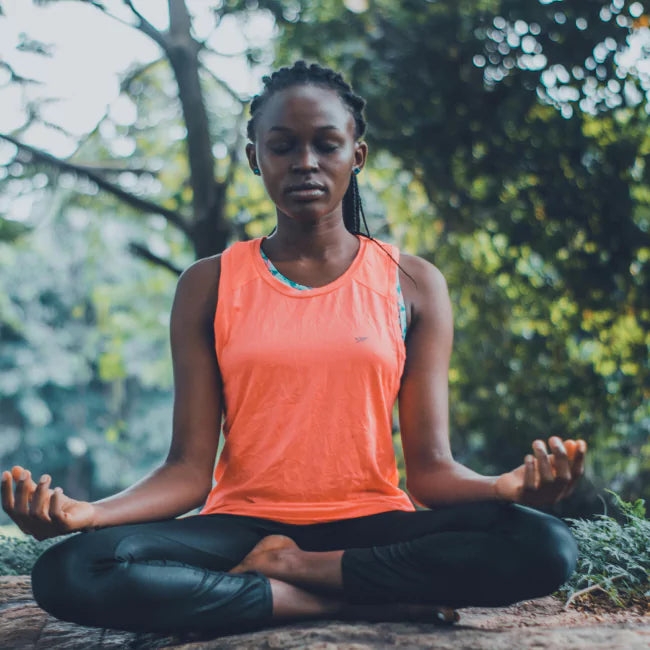How Meditation for Athletes Can Improve Your Performance
 By: by Amino Science
By: by Amino Science

An unfocused mind is one that’s ripe for defeat. So prime yours for victory instead, with meditation for athletes. While the idea that meditation could improve athletic performance might once have sounded too alternative to be taken seriously by the locker room crowd, now that famous and highly successful athletes including Novak Djokovic, Kobe Bryant, Lebron James, and Derek Jeter have vocally endorsed its benefits, it's practically mainstream. You can even find meditation apps designed to help you use mindfulness training to become a better athlete.
Given the raft of benefits meditation has for your overall health, and that there's no cost involved with taking up the practice, there's nothing to stop athletes of all levels from exploring how sports meditation can help them hone their skills.
What Is Mindfulness Meditation?
Before we delve into the ways that meditation can benefit athletes, it's important to ensure we share the same definition of meditation. The foundational concept of mindfulness meditation—the cultivation of intentional, nonjudgemental awareness of the present moment—comes from Buddhism. The practice of mindfulness meditation in the present day, however, has expanded to include secular practices denuded of the spiritual elements involved in a traditional Buddhist meditation practice. No matter your religious affiliation, or lack thereof, it's practically guaranteed that you can find a complementary way to engage with mindfulness meditation.
Researchers have found that establishing a regular meditation practice can actually spur the development of new neural pathways that encourage both enhanced focus as well as smoother emotional regulation. Furthermore, it can decrease the density of brain matter in areas such as the amygdala that are responsible for encoding negative emotions.
Already, you can see the ways meditation can be a beneficial tool for athletes. We all perform our best when we're able to remain focused and calm, to remain present rather than ruminating on any mistakes we may have made or fear we may make.
Why Meditation for Athletes Results in Success
For elite athletes in the modern age, success depends largely on cultivating a mental edge that will allow them to outplay their opponents. Physical fitness is a prerequisite, but mental fitness often determines who wins and who loses.
Keith Kaufman, Ph.D., a Washington, DC-area sport-psychology practitioner, researcher, and author of Mindful Sport Performance Enhancement, said in an address to the American Psychological Association: "It’s been suggested that many coaches regard sport as at least 50% mental when competing against opponents of similar ability. In some sports, that percentage can be as high as 80 to 90% mental."
The results of a study done with 235 Canadian athletes during the 1984 Winter and Summer Olympic Games in Los Angeles and Sarajevo neatly illustrates Kaufman's assertion. The authors used a combination of individual interviews and self-completed questionnaires to asses athlete readiness in three crucial arenas: mental, physical, and technical. This allowed them to identify which element was most likely to correlate with success, as well as how a lack of mental, physical, or technical readiness might interfere with optimal performance. Their assessment showed that mental readiness was the only one of the three factors with a significant link to success at the Olympics.
As sports meditation is a sharpening kit for an athlete’s mental edge, there’s little doubt that its practice can help spur athletes to victory.
Achieving the Mindset of a Champion
In addition to the compelling scientific evidence offered by the study cited above, there's also the fervent testimonials about the power of meditation shared by Phil Jackson, the NBA’s all-time most decorated coach.
In his book 11 Rings: The Soul of Success, Jackson underscores the relationship between mindfulness and the on-court success of his 11-time championship Chicago Bull and Los Angeles Lakers teams.
“When I had the players sit in silence, breathing together in sync, it helped align them on a nonverbal level far more effectively than
His insight wasn’t merely a theoretical one: by helping his teams develop a razor-sharp, single-minded focus, Jackson won more NBA championships than any other coach before or since. Thanks to his remarkable track record, Jackson became something of a poster child for the benefits of meditation for athletes. He implemented Zen philosophy and mindfulness techniques in order to foster his players' mental strength. After introducing mindfulness techniques in training camps, he then established it as a standardized process. According to Jackson, this mental training was every bit as important as the physical training his teams underwent.
While most people don't have the time or pre-existing fitness level to carry out the kind of physical training NBA players do, anyone can use sports meditation to break through plateaus and reach the next level.
3 Ways Meditation Improves Sports Performance
If you take the long view, all the benefits of meditation will likely improve your athletic performance. Consider, for instance, how decreased stress and increased self-awareness could influence your success at your chosen sport. Some benefits, however, have even more direct and apparent benefits. While the science on meditation for athletes is still developing, the findings so far are highly promising.
A Norwegian research team lead by the head manager and mental trainer of the Olympic Athlete program in central Norway examined how mindfulness training impacted stress, perceived performance, and athlete burnout among junior elite athletes. Qualitative analyses showed that mindfulness positively impacted awareness, recovery, and performance. In an article on the study that they published in the Journal of Health Psychology, the authors discussed how the changes produced by meditation translated into an increased motivation to exercise and greater satisfaction with workouts. It appears that by increasing our capacity to stay rooted in our present experience, we can more readily access valuable resources such as motivation and perception of success.
Here are three more scientifically validated ways meditation techniques can help athletes maintain peak performance.
1. Enhanced Visualization Ability
Arnold Schwarzenegger said that when it came to his success in the sport he dominated—bodybuilding—what was most important was “putting your mind in the muscle.” He would create a mental picture of what his muscle was doing during each weight-lifting exercise, thereby making a mind-body connection.
Meditation offers the perfect opportunity for the type of visualization Schwarzenegger described. In fact, it itself is the very definition of the type of mind-body connection necessary for optimal performance. Training your mind so that you can quite literally see your future successes with this discipline gets you one step closer to making them a reality.
Dr. Michael Gervais, a sports psychologist who has trained the Seattle Seahawks, Olympic gold and record-breaking Austrian skydiver Felix Baumgarten, among others, actually prefers the term "imagery" to "visualization" as he believes the former helps to remind practitioners to engage all five senses, not sight alone.
"The objective is to create such a lifelike experience that your body believes that it could be real," Gervais explained in an interview. "So there's a switching on or an animation that happens within you when you create an image that is crisp and has color, and sound, and smell, and taste." Doing so prepares your mind for what might happen in the moment, allowing you to have an optimized response ready.
2. Improved Immune Function
If you’re in bed with the flu, you can’t compete. As a result, you’ll want to keep your immune system in peak condition. According to a study published in the Annals of the New York Academy of Sciences, a consistent meditation practice can produce positive changes to immune activity biomarkers.
To determine whether connection exists between mindfulness meditation and improved immune system function, the study authors conducted a comprehensive review of randomized, controlled trials that included data from 1,602 participants. They looked specifically at how meditation affected five measures of immune function:
- Circulating and stimulated inflammatory proteins
- Cellular transcription factors and gene expression
- Immune cell count
- Immune cell aging
- Antibody response
The results pointed to an association between mindfulness meditation and changes in select biomarkers of immune system activity, though the researchers did note that further research would be needed to confirm the association. Based on their findings, however, they stated: “These shifts in immune system activity could potentially have beneficial effects on health by influencing mechanisms that are known to affect biological aging and disease.” Specifically, meditation shows promise for reducing inflammation in the body, increasing cell-mediated immunity, and boosting enzyme activity that helps protect cells from aging.
3. Higher Quality Sleep
A well-rested athlete is one that’s primed for victory, so for anyone seeking to maximize their performance, sleep should be a top priority.
A study from the University of Utah found that participants who ranked themselves high for the trait of mindfulness had better emotional regulation throughout the day and experienced less cognitive and psychological activation (e.g. racing thoughts) before bedtime, leading to a higher quality of rest.
By incorporating meditation into your daily routine, you can ensure that you fall asleep more easily and get the deep, uninterrupted sleep you need to succeed.

Putting Sports Meditation into Practice
If you're ready to experience the benefits of sports meditation for yourself, here are three proven techniques you can try.
1. Morning Mindfulness
If your morning starts off foggy, your workouts and in-game performance may suffer. Avoid this by adding mindfulness meditation to your morning routine. If you start each day by being completely present in the current moment—by bringing your mind home to your body—you pave the way for achieving that same centered mindset under pressure.
Here’s how it works: Whatever you’re doing at the present moment becomes the most important thing in the world. Imagine that you're washing the dishes. While doing so, notice the feeling of the water on your hands, the smell of the dish soap, the way the water droplets splash against the side of the sink. This brand of disciplined observation keeps you rooted to the present task while funneling out unwanted distractions.
This morning mindfulness practice instills the essential lesson that mindfulness does not require that you sit silently in a stationary position. Instead, you can practice mindfulness by applying your undivided focus to completing a specific task.
By becoming a more mindful person, you’ll become a more mindful athlete. And when it comes time to perform, you’ll be able to block out all the noise and focus on the task at hand, thanks to your unshakeable focus.
2. Pre-Workout Hatha Yoga
Hatha yoga, a discipline that includes Ashtanga, Vinyasa, Iyengar, and Power Yoga, helps to foster mind-body awareness and mindfulness by focusing on the physical aspect of meditation—namely matching breath to movement. As an added bonus, it aids flexibility and improves posture. All things that can help an athlete excel during an intense workout.
Incorporating hatha yoga pre-workout can help ensure that you get the most out of your training session. Whether you engage in a slower paced traditional hatha yoga class or a more vigorous power yoga session, be sure to take 5 minutes in Savasana, the resting pose, to connect to the stillness in your body and visualize the performance goals you hope to reach during your workout.
This type of yoga is also a wonderful post-workout recovery tool and an exercise option for your days off.
3. Pre-Game Mantra Meditation
Chants or “war cries” have long been a common method of getting athletes pumped up before a big game or competition. Mantra meditation offers a more targeted take on this concept.
This ancient method of focusing the mind centers on the use of a sound, word, or phrase. It can be as simple as chanting “om” three times, or as intricate as developing your own individualized pre-game mantra. Recitations can be performed aloud or silently and facilitate stress reduction to produce a relaxed warrior-athlete who’s primed for victory.

No matter where you fall on the athletic spectrum—whether it’s having never played sports in your life or having trained intensely over the course of many years—by practicing the meditations listed above you’ll get a boost in reaching your performance goals.
If you're aiming for an even bigger boost in athletic performance, Perform, an essential amino acid supplement created by the world's foremost amino acid experts, can increase peak strength and endurance levels during exercise. Learn more here.

Up to 25% off Amino
Shop NowTAGS: bodybuilding cardiovascular strength training
Join the Community
Comments (0)
Most Craveable Recipes




 833-264-6620
833-264-6620



















